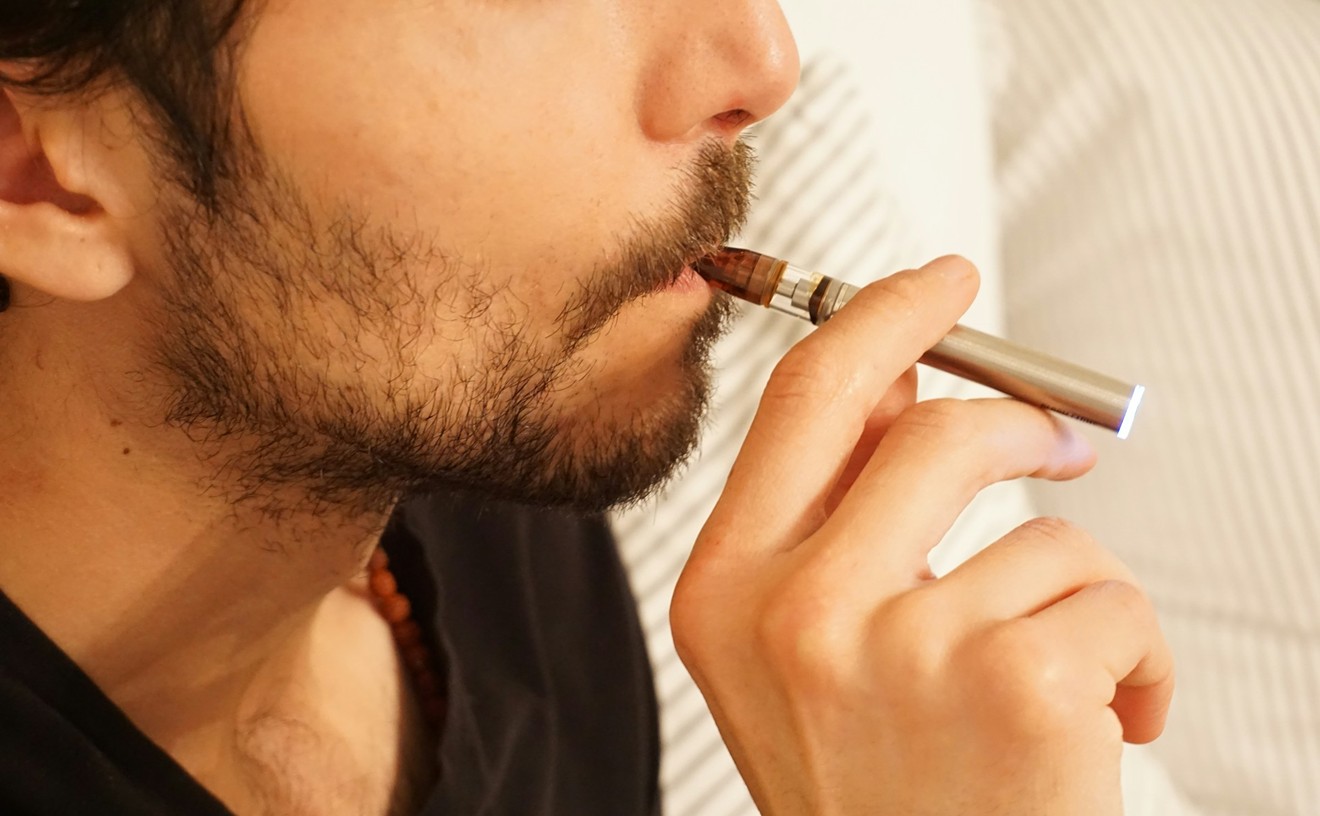As we approach our favorite unofficial holiday on April 20, it's nearly impossible to know the immediate future of Colorado's cannabis industry, with numerous regulatory and societal changes (and un-changes) surrounding the plant less than a month into the pandemic. But weeds are tough plants — and essential ones, too, according to the State of Colorado. To get more perspective, we caught up with a half-dozen cannabis trailblazers and OGs, all of whom were here before retail was legalized and the money quickly followed. Some have adapted to the evolving culture, others have refused to compromise, but all play a role in how we view the plant now — and how 4/20s of the future might look. Here's the second in our "Rolling With the Punches" series, an interview with cannabis consumer activist Larisa Bolivar.
Any cause worth fighting for needs warriors on the front lines, and that's where you'll find Larisa Bolivar. The founder of the Cannabis Consumer Coalition has been an activist for two decades, calling out anyone she feels isn't serving the greater good while carrying the torch of her mentor, Ken Gorman, whose 2007 murder has yet to be solved. When Colorado health officials started flagging commercial weed for dangerous pesticides in 2015, it was Bolivar who discovered the first list of offending grows.
She's since founded a hemp and CBD company for her day job, but Bolivar can't help but remind the cannabis establishment of its true roots, no matter how much money is made. And of all of our interview subjects for this project, she was the only one consuming cannabis during our chat.
Westword: Denver now has a history of taking the first step with marijuana and psilocybin. Why do you think it's become a breeding ground for drug reform?
Larisa Bolivar: Passing Amendment 20 in 2000 [to legalize medical marijuana], Colorado just became a more fertile ground to argue for recreational cannabis use and psilocybin. I think once people saw the sky didn't fall after medical legalization, they could try recreational use on the back of medical legalization, and then psilocybin jumped off the back of that. We still have a lot of messes to clean in Colorado cannabis and hemp, and right now social equity is a big one. But even that is now being co-opted by wealthy white men, masquerading it as concern.
How legal do you think cannabis really is in Colorado?
I don't think it's very legal. It's taxed, but is it legal? A lot of people wonder that. It's still a very prohibitive market — certainly not a free market — and even though arrests around cannabis are dropping, the arrest statistics still skew toward people of color, and people selling cannabis are still getting arrested. To me, that seems like a way to create a licensing structure but still continue the drug war. I don't see any true measure of trying to help create actual business for people with former cannabis charges. The way legalization played out is that a big customer base developed by the black market was taken over without any attempts to bridge the two. That's why you're seeing these big businesses fail to capture cannabis consumers.
The black market still provides good weed, and nobody wants boof weed, even if it's sold at a dispensary. Big businesses aren't hiring the true growing talent, so you're not going to see the same consumer satisfaction with them. It's a failing structure.
Being first is used both as a boast and a defense mechanism by Colorado lawmakers when asked about our successes and shortcomings in legal cannabis. Now that there's been time and examples from other states, what do you think we need to improve on?
We're not first anymore in a lot of things. We're not first in social equity. When you look at newer states, like Illinois, for example, social equity is first and foremost in the legalization language — versus here, where everyone is worried about looking bad because of other states. It's not always about being first. I ran one of the first dispensaries here. Were we good? Not really. The weed was good, but we had a lot to learn.
Other states have improved upon a lot of our regulations. I stay here because my family home is in Denver, but I've always found the cannabis business and policy in Colorado to be hostile. That's because there was this big rush for credit at the beginning, when everyone wanted to work on policy. But maybe it's time to diversify, so the same four lobbyists aren't working on cannabis policy all the time. I would beg to argue that Colorado hasn't led anything since first legalizing. It's not regulated like alcohol at all here, but that's what was sold to us. My mentors wanted this grown like tomatoes, and that's why many of them opposed the dispensary model in the first place.
Just how drama-filled is legal cannabis nowadays? Was it more unified before 2012?
No, it was always segmented. We've always had people fighting for big business over consumers. I've never felt any warm and fuzzies for the sacrifices I've made. I'm not saying I'm alone or don't have friends and followers, but this has always been a hyper-competitive space. It's clique-ish, so you have forces of unification within groups, no different from high school. But there's a frenzy of ego and greed in cannabis right now. Everyone wants credit and wants to be first. That's why you see people racing to California or other states when they [come online].
After the media started covering cannabis day in and out, everyone who wanted attention flooded the conversation and fucked this up. That's why I think all these larger companies are imploding or shifting leadership — because the wrong people created the wrong foundation. You have all these people who never ran a business trying to go around the country to give cannabis business advice because they were on TV once or twice, and it's alienating some amazing underground growers.
The 420 Rally was not what it is today. It was about coming together and taking a risk before recreational took over, and not making a bunch of money. Many of us, including myself, had been raided. This was a movement for social justice. Now it's a chance for people to make millions of dollars.
Do you feel like someone should have some skin in this game to profit from it?
I'm lucky in having a lot of connections. I've been patient and played a long game. I've also struggled really hard in this industry as a woman of color, and people are always trying to take you down. But those who are interested in the industry now are generally much more well-funded and respected in the traditional sense. I know a lot of people with small businesses who need the proper funding. I've also been snubbed in meetings for bringing up social equity with companies that publicly support it. It's a tricky path.
Medical patients and caregivers helped lay the foundation for recreational legalization. Where do you think they sit within Colorado's cannabis framework now, over six years after recreational stores opened? [She coughs.] Did you just take a hit?
Yeah.
But in all seriousness, this is a really sad tale. There were a lot of missed opportunities five to seven years ago for alliances within the medical community. Disjointed efforts around medical patients and the fervor for recreational after it took over kind of limited the effort to rescue the medical movement, and it's since been kind of thrown to big pharma. That's an entirely different conversation, but it's strange to me how Colorado took this strong CBD turn while medical marijuana was left to the sharks.
The medical marijuana patient/dispensary-caregiver relationship used to be a very personal one. Those sort of relationships are gone now, except in one-on-one cases, like what I have with me and my uncle. Instead of helping 100 people, caregivers are helping one. I think a lot of in-fighting in the medical community hurt those efforts in hindsight. And it makes defending medical marijuana from the GW Pharmaceuticals of the world much harder.
At one point in time, there was an actual concern for patients. Once they saw we had a workable model for legal cannabis, that's when everything changed. Republican strategists who used to oppose legalization are now working in cannabis. How did a bunch of rich white people take over cannabis? Once you start following the money, it's easy to figure out.
Do you consider Colorado's recreational legalization a win or loss for cannabis users?
Overall, fewer people are prosecuted for cannabis now. We've had positive global and community changes from this. That absolutely took a unified effort. Was it unified in the sense that people wanted to help each other? Hell, no. But it was unified in the sense that issues were addressed; it just wasn't for the right reasons.
I really do miss the old days, when there was still a sense of unity. I really miss how it was before media wasn't involved in cannabis. This biggest misunderstanding about me is that I want media attention, which is false. I have PTSD, and this is stressful.
But this went to shit once the egos and media were involved. My mentor, Ken Gorman, was killed, and I've lost patients. This means everything to me and so many others.
[
{
"name": "Air - MediumRectangle - Inline Content - Mobile Display Size",
"component": "12017618",
"insertPoint": "2",
"requiredCountToDisplay": "2"
},{
"name": "Editor Picks",
"component": "17242653",
"insertPoint": "4",
"requiredCountToDisplay": "1"
},{
"name": "Inline Links",
"component": "18838239",
"insertPoint": "8th",
"startingPoint": 8,
"requiredCountToDisplay": "7",
"maxInsertions": 25
},{
"name": "Air - MediumRectangle - Combo - Inline Content",
"component": "17261320",
"insertPoint": "8th",
"startingPoint": 8,
"requiredCountToDisplay": "7",
"maxInsertions": 25
},{
"name": "Inline Links",
"component": "18838239",
"insertPoint": "8th",
"startingPoint": 12,
"requiredCountToDisplay": "11",
"maxInsertions": 25
},{
"name": "Air - Leaderboard Tower - Combo - Inline Content",
"component": "17261321",
"insertPoint": "8th",
"startingPoint": 12,
"requiredCountToDisplay": "11",
"maxInsertions": 25
}
]













